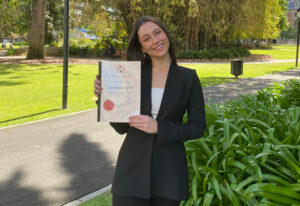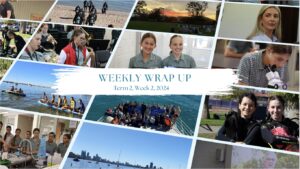Understanding the Voice to Parliament Referendum: A Year 12 Initiative

The Voice to Parliament referendum in Australia has been generating a significant amount of discussion. With so much conflicting information surrounding this issue, our Year 12 students decided to take matters into their own hands to gain a clearer perspective on the matter.
The Diversity Committee and the Year 12 Politics & Law ATAR class collaborated to organise a captivating Q&A session featuring Simon Forrest. Simon Forrest is an esteemed Emeritus Professor, Wadjuk and Nyoongar Elder, Fellow at Curtin University, and Officer of the Deputy Vice-Chancellor (Academic).
Breaking Down the Referendum
Scheduled for 14 October 2023, the Voice to Parliament referendum stands as a pivotal moment in Australian politics. If passed, it would bring about an amendment to the Australian Constitution, recognising the First Peoples of Australia and establishing a ‘Voice’ to parliament. This ‘Voice’ would empower Aboriginal and Torres Strait Islander communities, granting them a voice in decisions, policies, and services that shape their lives.
For the referendum to succeed, it must secure a majority of votes in a majority of states. Its significance lies in its potential to recognise the rights of Indigenous Australians and potentially bring about the first constitutional change in almost fifty years. The referendum presents Australians with a YES or NO vote on amending the 29-page constitution. This amendment would add a new chapter, consisting of one section, to establish the Aboriginal and Torres Strait Islander Voice and grant Parliament the authority to enact laws pertaining to this body. In essence, the Voice would have the ability to advocate to Parliament and the executive government on matters concerning Aboriginal and Torres Strait Islander people.

Professor Simon Forrest's Insights
Professor Forrest, with his extensive knowledge and experience, imparted an understanding of the significance of the referendum to the students. He examined the referendum’s potential positive impacts, shedding light on Aboriginal people’s longstanding efforts to amend the constitution. Despite five unsuccessful attempts, he highlighted the cyclical establishment and dissolution of advisory groups by the Federal Government, emphasising the need for constitutional recognition to ensure an ongoing voice for Indigenous Australians. This recognition would grant them a permanent seat at the table when addressing matters concerning their community.
Professor Forrest also discussed the Uluru Statement for the Heart, a momentous declaration made in May 2017. This statement aimed to foster unity between First Nations Australians and the wider population, urging collaboration in shaping a better future. With great conviction, the Uluru Statement from the Heart proclaimed the aspiration for constitutional reforms that empower Indigenous people and grant them their rightful place in this land. It envisioned a future where their children thrive, bridging both worlds and sharing their culture as a precious gift to the nation. The statement called for the incorporation of a First Nations Voice into the Constitution, recognising the importance of Indigenous representation. He encouraged all who are voting to read this one-page summary statement.
After the Q&A session, student leaders explained the process of voter registration for Year 12s not yet registered.
This initiative by our Year 12 students proved to be an invaluable learning opportunity. It not only enhanced their understanding of a significant political event but also demonstrated the importance of taking proactive steps to educate themselves.
As we approach the Voice to Parliament referendum, it is crucial for everyone, not just students, to understand what they are voting for. Only with comprehensive knowledge can we make informed decisions that shape our society’s future.

Caitlyn Goldney (2013) Embarks On A Legal Career
Caitlyn Goldney (2013) is a passionate advocate dedicated to giving back to the community through her legal savoir faire.

Combating The Attention Span Crisis In Our Students – Jennifer Oaten
It is no secret that attention spans have been steadily declining, especially among younger generations growing up immersed in digital technology. The average person’s attention span when using a digital device has plummeted from around two and a half minutes back in 2004 to just 47 seconds on average today – a dramatic 66% decrease over the past two decades.

Weekly Wrap Up: Term 2, Week 2, 2024
Week 2 has come to an end! This Weekly Wrap Up features highlights from Scuba Diving Club, the Sisterhood Series, and Boarding ANZAC Service.
- Featured
Author: Santa Maria College
Santa Maria College is a vibrant girls school with a growing local presence and reputation. Our Mission is to educate young Mercy women who act with courage and compassion to enrich our world. Santa Maria College is located in Attadale in Western Australia, 16 km from the Perth CBD. We offer a Catholic education for girls in Years 5 – 12 and have 1300 students, including 152 boarders.






